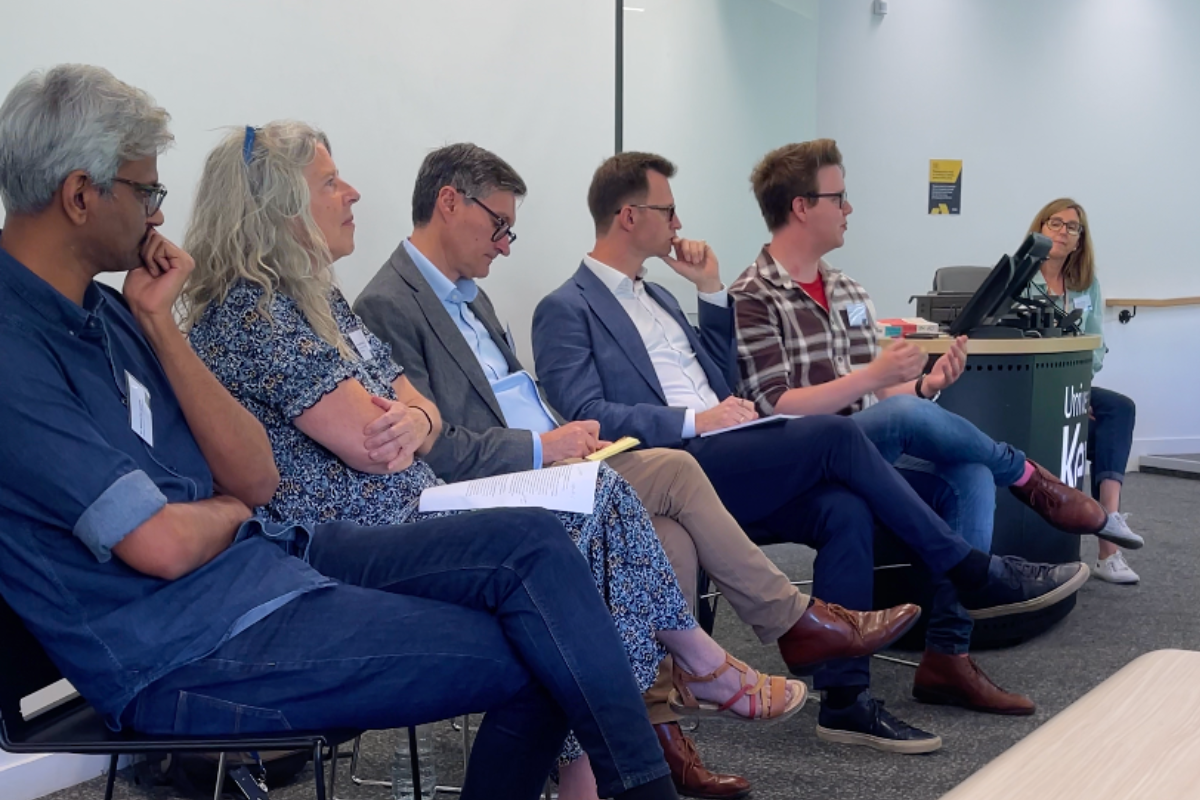Our panel delivered on their promise to share their Election Result 2024 expert opinions.
For 14 years straight, the Conservative Party ran the show in the UK – and a lot has changed since 2010. So, with the Labour Party now in charge, what does that mean for us?
Chaired by Jane O’Mahony, Director of Education for Kent’s Division of Human and Social Sciences, our panel kicked off with each of our Kent colleagues giving a short introduction with their POV on the election results, with individual focus in their areas of expertise.
First up was Ben Bradley, Kent Union’s outgoing Vice President for Postgraduate and International Experience, who brought us much-appreciated insights from a student’s perspective.
Ben said that students have not been the focus of this election – most of the main parties didn’t have policies that were aimed at UK universities. Kent Union surveyed Kent students and found a “relative amount of voter apathy”.
“Generally, the sentiment we got amongst students was that they didn’t really care – they felt the government wouldn’t change much for them regardless of who it was, plus they assumed it was a done-deal-Labour-landslide.”
Ben Bradley – Kent Union’s Vice-President Postgraduate & International Experience
“But, I think the in terms of the ‘main parties’, the only ones to have any solid student policies were the Lib Dem’s with their promise to provide maintenance grants (instead of loans) to those from the lowest income backgrounds. The Greens I’m relatively sure were offering a fair amount of pro-student policies, but by a lot of voters generally, they weren’t seen as a real choice (something which may change now since they did so well in the recent election!)”, said Ben.
Next up was Adrian Pabst, Professor of Politics, who spoke about the disconnect between our existence and the Tory party shenanigans – and said that:
“Yes there is a new government with a thumping seat of majority in the House of Commons, but you know things can’t always get better and I think we all learned that after 1997.”
Adrian Pabst – Professor of Politics
Adrian said that the Conservative Party has lost voter trust (seen in Wales where the Conservatives lost all constituencies) in just 4.5 years since the last election.
On Labour, he said that their support is broad but shallow:yes they won, but can they govern? They have a broad range of voter profiles from different socio-demographic groups, so how will Starmer be able to appease everybody? (or make them all happy, or appeal to everyone?).
He also posed the question as to whether the First Past the Post electoral system is still tenable, as it’s not representative, and noted that across the board, all previously known safe seats are no longer safe – Reform UK successfully won-over former Tory voters and came 2ndin 98 constituencies (source).
Richard Whitman, Professor of Politics and International Relations, brought views from a security and defence angle. He said that while the previous elections ran around a foreign policy issue, that being our EU membership:
“Foreign Security and Defence Policy was something of a ghost at the feast of this 2024 election.”
Richard Whitman – Professor of Politics & International Relations
“And this is despite the fact that there is war in our continent and war in our neighbourhood in Gaza”.
Richard said that the UK is the most intimately connected country to the US in terms of security measures, and posed how will the UK deal with Trump now, compared to Theresa May’s cabinet who “held him tight” – since we can’t afford for US commitment to retreat from the UK.
Next, up was Head of School of Economics, Dr Amanda Gosling commented on what the election results meant for the UK’s economy and macro-economic policy.
She said that we are now witnessing “stagnated living standards” in the UK, and a great deal of inequality. Also, there has been a greater prevalence of zero-hour contracts, which allow employees to be taken advantage of. On this, Amanda said:
“Cats will hunt mice, firms will hunt profit”
Amanda Gosling – Economics Head of School & Senior Lecturer in Economics
“Compare the UK’s living standards now to those of 1997 when the last Labour government came in, they had a whole remit of policies to deal with that, i.e. minimum wage and reformed working families’ tax credits.” And now what is Labour able to offer to raise living standards? This is unclear.
Lastly before the floor was opened to questions from the audience, Dr Nikhil Sengupta, Senior Lecturer from the School of Psychology, shared his insights from his research on political psychology, including how individuals’ attitudes towards politics change over time.
He spoke of what is termed the affective polarisation between the two main parties, Conservative and Labour, and that there is weak data to back up theorised “anti-democratic attitudes”. Instead, however, Nikhil said that people ‘simply being angry at each other is not anti-democratic’.
“We DO need people to care. That is democracy. It relies on people caring.”
Nikhil Sengupta – Senior Lecturer in Psychology
Read more about Nikhil’s research exploring UK public opinion at a time of major societal change in the UK – click here!
Overall, the whole panel had a well-rounded voice with different experts sharing their knowledge, which framed the election results in multiple different ways for the audience. All our panellists were agreed that the challenges for the new Labour Government over the next five years are indeed great. As Rishi Sunak so gently put it whilst congratulating Keir Starmer on Labour’s victory: “as he (Starmer) takes on his formidable task, he and his family deserve the good wishes of all of us.”
We also had a whiteboard for everyone to write the ideal PM of their dreams – featuring the classics such as Sir David Attenborough, Guz Khan, and of course, Shaun Ryder (obviously).





